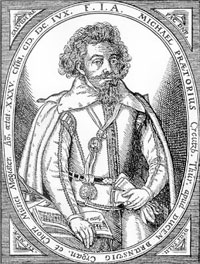by Daniel Hathaway
Jeannette Sorrell brought the alternately dazzling and charming music of Michael Praetorius to life once again at Trinity Cathedral on Thursday evening, in her compilation program, “Christmas Vespers” — with a little help from Apollo’s Fire’s 20 instrumentalists, 27 adult singers and the 15 young vocalists who make up Apollo’s Musettes. And a near-capacity crowd of happy listeners.
Her sidespeople comprised six string players, including viola da gamba, a wind band of ten (recorders, cornetti, Trumpets, three sackbuts and percussionist) a continuo group of four (count them: three long-necked lutes or theorbos! — in addition to organ and harpsichord (Sorrell herself) and seven soloists who moved in and out of the choir during the complicated choreography that brought the right people to the right place for each variously scored piece.
Mostly drawn from the collection called Polyhymnia caduceatrix, compiled in 1619, two years before the composer’s death at the age of 50, but also using material from his Musica Sionae, Puericinium and the dance collection Terpsichore, the program ranged from the simple (chant and liturgical snippets, stark, early Lutheran chorales sung in unison and M.P.’s greatest hit, Lo, how a rose) to the fascinating polychoral complexity of works in the Venetian ceremonial style (Gloria sei Gott, and In Dulci Jubilo).
In between, we were treated to such treasures from Praetorius’ vast music collection as the striking Ach, mein Herre for three sopranos, viols and theorbos, the colorful Magnificat (centerpiece of Vespers but here oddly divided into two parts separated by the Morning Star carol and characterized by cute word-painting gestures) and a folksy setting of the Ten Commandments nicely sung by four of the Musettes (who were deployed in various ways throughout the evening). Those and a set of dances from Terpsichore no Lutheran congregation one would have encountered during a service in Praetorius’ day. But, hey, Jeannette Sorrell’s program notes stated very clearly that her “primary goal has been to create a vivid and compelling concert experience” rather than a recreation of “Vespers in Wolfenbüttel on Christmas Day in 1618”. The dances were fun. The well-arranged program book with complete texts and translations made it easy to navigate through the wealth of musical material.
Arranged on the platform under Trinity’s central tower, Sorrell’s forces were probably in the least favorable acoustic position in the space, which contributed to a certain diffuseness of sound throughout the evening. It helped to put soloists (cornetti as well as singers) in the pulpit and lectern where they achieved some profile over the rest of the ensemble, and there were some good gestures toward using the space creatively (trumpets and drum called the audience to attention with a fanfare from the back of the nave after intermission, and the chorus circled the audience in the nave for the closing In Dulci Jubilo).
Particularly fine contributions to the performance came from the cornetti — Apollo’s Fire was lucky to be able to field one of the world’s best players, Bruce Dickey — and from the violins (Johanna Novom and Julie Andrijeski), who had a dauntingly crazy cadential duet to play at the end of the first half. The soloists were given some tricky assignments as well, dealing with many words both in Latin and German, and having to sing some very challenging melismas during the course of some of the Venetian inspired pieces. Sopranos Kiera Duffy, Sandra Simon and Nell Snaidas gave an intensely dramatic account of the forementioned Ach, mein Herre, and alto Kirsten Sollek, tenors Marc Molomot and Scott Mello and bass Paul Shipper dispatched challenging lines of their own with cool professionalism. Soprano Peter Simon contributed some sweet, clear solos in the final piece, before which organist Peter Bennett dashed up to the cathedral’s big organ for a stylish performance of the chorale prelude Nun lob mein Seele.
Throughout, Jeannette Sorrell was a tireless traffic cop, keeping her sixty-two performers tidily in line with her baton, conducting only a few times from the harpsichord. Performing such complicated repertory in four different venues over five performances probably requires more rehearsal time than Apollo’s Fire has to spend in each acoustic. Given those conditions, the tightness of the ensemble on Thursday night was admirable, although some vocal and instrumental detail was obscured by the tricky acoustical challenges of performing in the Crossing.
But (as commentators always write at this juncture), these are quibbles. “Christmas Vespers” rises head and shoulders above most of the Christmas concert repertory audiences are likely to hear this month, and the music is completely delightful. Would that protestant church music in the 21st century had that compelling spirit and sense of joy. “In Dulci Jubilo, nun singet und seid froh” indeed! Thanks to Apollo’s Fire for unwrapping an early Christmas present five times this week.
PS. Wonder what a cornetto is and who plays this curious instrument? Stay in touch — we’ll be interviewing Bruce Dickey while he’s in town for a future issue of ClevelandClassical.




